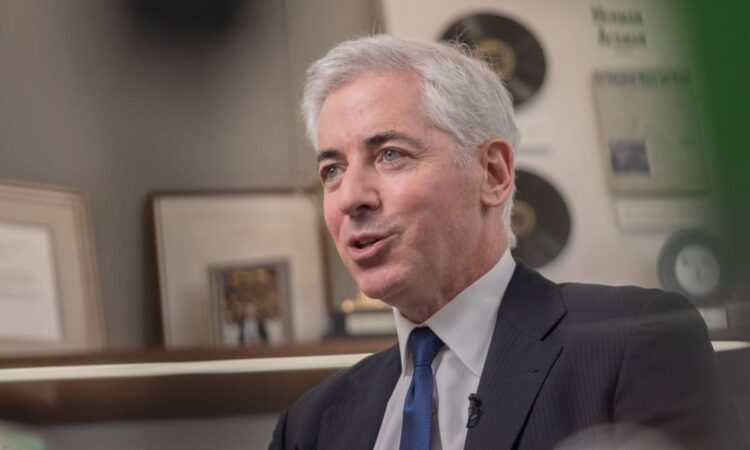
Investor Bill Ackman is trailing the
this year by about 10 percentage points as he readies the sale of a new closed-end equity fund—Pershing Square USA—that could total $25 billion.
The investor roadshow for the new fund—which will trade under the ticker PSUS—began Tuesday, and the deal is expected to price early in the week of July 29 at $50 a share.
Ackman is using his star power—he has over a million followers on X—and strong returns in the past five years to sell what will be the biggest U.S. closed-end fund ever. This year, however, hasn’t been great, as he has very limited exposure to the Magnificent Seven stocks that have driven the stock market.
is his only holding among the seven.
Ackman’s main current investment vehicle,
a European-listed closed-end fund with a market value of about $10 billion, was up 5.7% through June 30 based on its net asset value (NAV), according to the fund’s website. That’s behind a 15.2% total return for the S&P 500 index. The fund mostly reports its returns weekly.
Ackman, who heads Pershing Square Capital Management, is believed to be seeking to raise $25 billion for Pershing Square USA, but he has not set a target publicly.
Advertisement – Scroll to Continue
He faces some hurdles, notably a moribund closed-end market in which there has been virtually no issuance since 2022. Ackman’s fund would be by far the largest in the U.S. closed-end market, where the current biggest fund totals about $5 billion.
The best gauge of Ackman’s performance is Pershing Square Holdings, whose shares are traded in
(PSH.UK) and on
(PSH.Netherlands) as well as over the counter under the ticker PSHZF.
The fund’s shares, which are up 1% at $53.73 Tuesday, had gained 14% through midyear—better than the performance of the underlying portfolio—because the discount to asset value narrowed this year to 23% from 29%.
Advertisement – Scroll to Continue
The fund’s shares have returned 26.5% annually in the five years ended in June, way better than the S&P 500’s 15% annualized gain in that period. But the stock is nonetheless behind the S&P 500 in the longer term, since the fund went public in 2014 at $25 a share. Since then, the fund has returned 9% annually through June based on its share price, behind the 13.5% yearly return on the S&P 500.
The fund’s performance over the 10 years is better based on its NAV, at around 12% annually but still behind the S&P 500. The disparity between the fund shares and fund NAV performance reflects the discount on the shares relative to NAV. Ackman’s 10-year returns are dampened by a tough stretch from 2015 to 2017, when he badly trailed the market.
Closed-end funds issue a fixed number of shares and can trade at a premium or discount to their asset value based on investment demand. Most U.S. closed-end funds trade at discounts, as do those in Europe.
Pershing Square Holdings holds a concentrated equity portfolio that includes
Alphabet,
and
Restaurant Brands International
.
Advertisement – Scroll to Continue
Among those investments, Alphabet, Hilton, and Chipotle are higher this year, while Restaurant Brands and Howard Hughes are in the red.
Ackman, like many active managers, hasn’t had enough exposure to the Magnificent Seven stocks. At least based on March 31 filings, he doesn’t own
Nvidia
,
and
which have led the market this year.
Advertisement – Scroll to Continue
The new closed-end equity fund will invest primarily in “12 to 20 core long-term holdings in large-capitalization, investment grade, free-cash-flow-generative North American durable growth companies,” according to its prospectus.
Ackman might also make macro bets, like one he made in 2020 against corporate bonds that proved a big winner for Pershing Square during the pandemic selloff.
Ackman faces some challenges in selling Pershing Square USA. Investors can buy his European closed-end fund at a recent 23% discount to NAV, although that fund has some complex tax implications. The new fund will have a high annual fee of 2%, double that of most actively managed equity funds. (Ackman is waiving that fee for the first year.) Then there is the tendency of closed-end funds to trade at discount to NAV, which has made it virtually impossible to sell a new one.
But Ackman doesn’t lack confidence, and he’s hoping to pull off the biggest U.S. closed-end fund ever—and one of the largest IPOs and fund offerings of any sort in recent years.
Write to Andrew Bary at [email protected]






